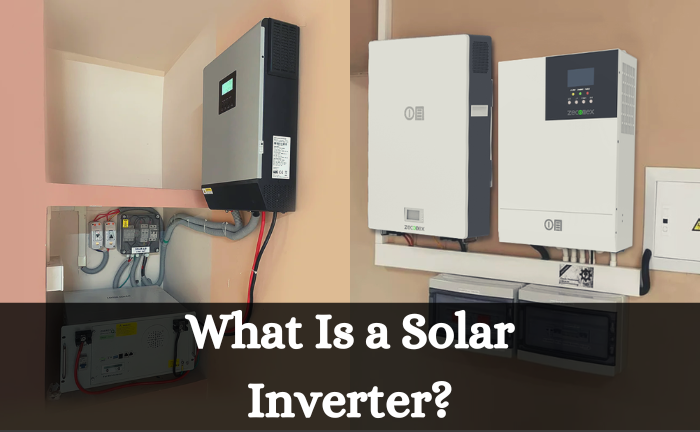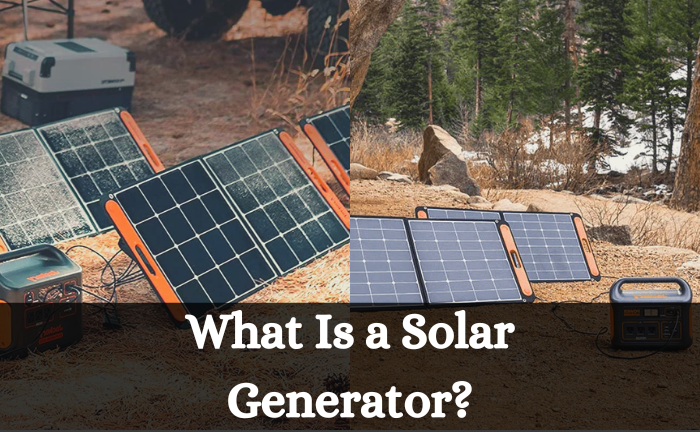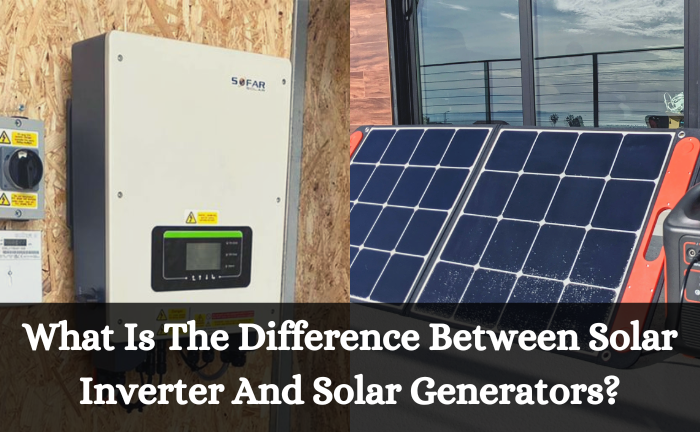Solar generators are certainly a perfect alternative to the power supply. I always hear the myth that generators and inverters are the same thing. Many of you might be mistaken because newly launched solar generators have built-in inverters. Let me make it understandable for you.
A solar generator produces electricity with the help of sunlight. Meanwhile, a solar inverter converts one type of electricity into another. Such as a solar inverter will convert the direct current (DC) taken from the sunlight into an alternative current (AC) used to run appliances.
In this blog, I’ll elaborate on the solar generator and solar inverter including their pros and cons. You’ll also get to know the major differences between solar inverters and solar generators.
Table of Contents
What Is a Solar Inverter?

A solar inverter is a device that takes the direct current (DC) from the sunlight with the help of solar panels and converts it into alternative current (AC) to deal with power outages.
You must be aware that only an alternative current electricity will enable your household appliances to work.
Solar inverters are of various types and sizes. You’ll be amazed to know that the new generators already have a built-in inverter in them so you don’t have to purchase a separate one.
How Does a Solar Inverter Work?
As you move along you must be thinking about how a solar inverter can work. Don’t worry. I’m here for your redemption. The solar panel is a crucial part of the whole solar system. A solar inverter can work only with the help of solar panels.
- First of all, you will connect the solar inverter to your solar panel and circuit breaker.
- According to my research, a solar inverter will convert the DC electricity to the AC electricity by comparing it to the voltage of the grid.
- Now, the alternative current will pass through the inverter to the appliances that you want to run.
Pros Of Solar Inverter
Here are a few advantages of solar inverters.
- Solar inverters are affordable so you can purchase them without worrying about budget.
- The windfall that I like about solar inverters is that they are easy to maintain and you can replace them whenever you want.
- They do not make noise so there’s no need to be concerned about noise pollution.
Cons Of Solar Inverter
Let me walk you through a few disadvantages of solar inverters.
- The efficiency of solar inverters might get reduced in shaded locations.
- Another drawback of solar inverters is a single-element failure can result in the disturbance of the whole system.
What Is a Solar Generator?

Now, I’ll tell you about the solar generator. A solar generator is the best source of backup power supply for camping or sudden power outages. Solar generators produce electricity from sunlight with the help of solar panels and inverters.
Solar generators are said to be portable so you can easily grab one with you on camping to light up essential appliances.
How Does A Solar Generator Work?
Here comes the time to walk you through the working of solar generators. A solar generator works with a few tools. These include;
- Solar panels
- Solar inverter
- Battery
- Charge Controller
The solar panels will take the energy from sunlight and the inverter will convert it into the alternative current. I suggest you get a battery for the storage of power. The AC electricity will move to the electric appliances.
However, the combination of all the tools combinedly makes a solar generator and their working gives you cheap electricity backup.
Benefits Of Solar Generator
I also want you to know the benefits of solar generators.
- As you know, it works in the sunlight so there will be no cost of fuel.
- Solar generators are less noisy than a gas fueled generator but a bit more noisy than a solar inverter.
- It completely relies on solar energy so you’ll never need to clean the dirt of fuel and toxicity of gases.
- Solar generators are easily moveable so you can grab it with you for camping and outdoor activities.
Disadvantages Of Solar Generator
Here are a few cons of solar generators.
- A solar generator will provide you with a limited power supply depending on the size of the generator and charging of the battery.
- The power supply of solar generators can be affected by weather changes.
Related: What Will A 1000-Watt Solar Generator Run?
What’s The Difference?
If you are still confused about the difference between a solar generator and a solar inverter, don’t be concerned. I will make it easier for you with the help of a comparison table.
| Difference | Solar Inverter | Solar Generator |
| Functionality | Convert direct current into the alternative current to power household equipment. | An alternative used to power household essentials during a power outage. |
| Capacity | Low Capacity Device | High Capacity Device |
| Power Source | Get its power from a solar generator. | Main source |
| Price | Approx $100 | Approx $200+ |
| Application | Used with solar generators and other devices. | Used in the region of long or sudden power outages and for camping. |
| Noise | Solar inverters usually make a beep sound when the electricity goes out or comes back. | The rotatory motor in the solar generators makes so much irritating noise. |
| Maintenance | Easy to maintain | High maintenance |
| Weight | A solar inverter itself is a lightweight tool but as you know it works with heavy batteries which makes it bulky. | A solar generator is heavy due to its metallic framework. It comes with wheels so you can move it wherever you want. |
| Portability | You can move a solar inverter as they’re fixed in a place. | Solar generators are portable as you can move them from one place to another. You can also take it with you for your activities. |
Related: Inverter Generator vs Generator – Which One?
Conclusion
In conclusion, I would like to say that a solar generator is one which produces electricity, meanwhile, a solar inverter converts the direct current into the alternative current. You have also gone through the pros and cons of both of them.
I have also given you the differences between solar inverters and solar generators. Now, you certainly have cleared your confusion about inverters and generators.

